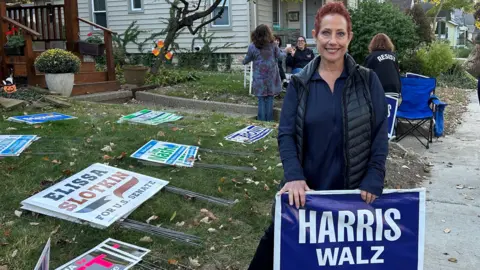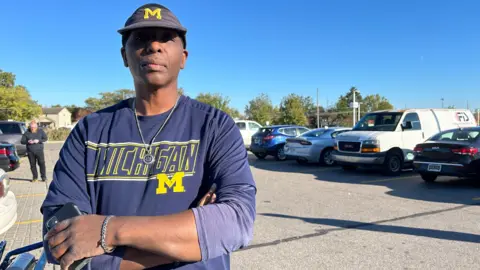Kamala Harris started ‘like a rocket’ in Michigan. Now she’s slipping

 BBC
BBCMarcie Paul is nervous.
A Democratic activist, Ms Paul has been knocking on hundreds of strangers’ doors, making phone calls and sending out flyers, all in an effort to woo people here to vote for Kamala Harris.
When Harris replaced President Joe Biden as the Democratic candidate in July, Ms Paul was hopeful, as she saw the vice-president go “off like a rocket” in Michigan.
The state is one of three “blue wall” states – along with Pennsylvania and Wisconsin – that went Democrat in 2020, and if won again, would help clinch a presidential victory for Harris.
But with less than a month to go before election day, Harris’s honeymoon period in Michigan could be ending, leaving her pathway to victory less certain. A Quinnipiac poll last week indicated Donald Trump is leading in the swing state by three points.
“To keep that pace for the whole race – even though it’s seriously abbreviated – would be really unrealistic for anyone,” said Ms Paul, a resident of West Bloomfield, Michigan and co-founder of the liberal advocacy group Fems for Dems. “But I thought that we’d be a little more comfortable.”
Ms Paul is among several Democratic organisers and lawmakers in Michigan who say the presidential race here is tighter than expected, even as the Harris campaign appears to be heeding lessons from 2016. Critics say then-Democratic presidential candidate Hillary Clinton lost the state because she took it for granted.
A reliably blue Midwestern state for decades before 2016, Michigan has since become a battleground state with 15 key Electoral College votes.
At this point in the election cycle four years ago, when it was Biden versus Trump, the Democratic candidate had a comfortable lead, and went on to win the state by 150,000 votes. Now it’s a dead heat.
There is “no obvious solution” for Harris to break ahead, said Michigan State University politics professor Matt Grossmann.
The Democrats have poured millions into advertising in the state. Harris’s entrance into the race led to more than 100,000 new volunteers in Michigan, while she has visited Michigan more than any other state besides Pennsylvania, according to her campaign.
Trump has also made at least a dozen stops in Michigan this year, but some campaign operatives have sounded the alarm that his campaign has let old-fashioned ground game tactics, like door-knocking and billboards, slide in several swing states, including Michigan.
But Harris is ramping up her campaign visits this week after at least three Michigan Democratic lawmakers warned of slipping support.
But the tightness of the race in Michigan should not come as a surprise to anyone, Michigan Democratic Party Chair Lavora Barnes told the BBC.
“No one operating here on the ground in Michigan should have, or would have, expected this to be any easier than it has been,” she said. “We always knew it was going to be hard.”
Up north, immigration and economy take centre stage
Although the state is far from the southern border, Democratic organisers keep hearing that immigration is a top concern for Michigan voters.
“I don’t understand why,” said Ms Paul, the Fems for Dems leader. “It’s just really not relevant for us.”
But the issue has resonated with many of the voters the BBC spoke to, including Mary Beierschmitt of Novi, Michigan.
“It’s a big issue,” she said, adding that she thought Harris had not handled the situation well as vice-president, when Harris was tasked with finding solutions to tackle the source of migration.
Illegal border crossing reached a record high last year. After the Biden administration enacted asylum restrictions, they fell to their lowest in four years.
Trump has made attacks on Harris’s immigration record a central part of his campaign. His focus has not just been at the southern border, but in midwestern states as well, including Michigan’s neighbour Ohio, where the former president has falsely claimed Haitian immigrants are settling illegally in the town of Springfield and eating residents’ pets.
Voters tend to blame the party in power for their frustrations with national issues like the economy and immigration, even if the Biden administration isn’t solely responsible for the border crisis and the rising cost of living, said Jonathon Hanson, a lecturer at University of Michigan’s Ford School of Public Policy.
“The downside for Harris and Biden is, although they’ve done a lot of things to help the economy recover from a major downturn, it’s a more difficult story to tell politically,” he said.
Trump also may have the upper hand among some swing voters in Michigan because he is more well known than Harris after four years in office and years in the public eye, said Mr Hanson.
Tim and Janet of Novi, Michigan, say they know Trump’s personality well – and they don’t like it. But the independent voters already cast their ballots for Trump because they believe he is better at articulating his policies than Harris.
“I can’t vote for somebody just because it’s a feel-good time,” said Tim, a 75-year-old who declined to share his last name for privacy reasons. “They need to be doing things and have policy initiatives that are going to be beneficial.”
But in the Detroit suburb of Warren, Harris’s new economic policies are swaying independent voter Darrell Sumpter.
The vice-president has laid out a number of economic proposals during her campaign, including a plan to offer first-time home buyers an average of $25,000, and an expansion of the child tax credit.
“I’ve never been able to even afford a house. I’ve been waiting for years,” said Mr Sumpter, 52, who voted for Trump in 2020 and is leaning toward Harris this year.
“I don’t want the country to regress right back to the same state it was with Trump,” he added.

Making the race local
In 2016, former secretary of state Clinton ran a predominately national campaign in the state rather than a local one, said Mr Grossmann.
“The ads were the same here as elsewhere,” he said. “They were about Trump’s personality and saying negative things, and there was a perception that that really didn’t work.”
She lost the state by only 10,000 votes.
Now, both Harris and Trump are focusing their messages in Michigan on the state’s largest industry, car manufacturers, as they try to appeal to working-class and union voters.
In recent weeks, Trump and his running mate JD Vance have criticised the Biden administration’s support of the electric vehicle industry, saying it will cost Michigan auto workers their jobs.
Harris and vice-presidential candidate Tim Walz have hit back, arguing Trump cost the state manufacturing jobs when he was president.
But on other local issues, vagueness may actually be beneficial for Trump, political experts say.
Michigan, home to the largest Arab-American population in the US, is the birthplace of the Uncommitted movement, a protest campaign to pressure Biden and Harris to secure a ceasefire in Gaza.
The movement has declined to endorse Harris, sparking worries that the reliably Democratic voting bloc will not turn out for the party this time.
Meanwhile, Trump has won over some Arab-Americans by saying less, Mr Grossmann said. The former president has been vocal about his support for Israel, but has also promised to end the war, without providing specifics on how he would do so.
“Among this community, to some extent, being vague or unclear has been an advantage,” Mr Grossmann said.
In Hamtramck, a suburb of Detroit where about 60% of the population is Muslim, the city’s first Arab mayor, a Democrat, has endorsed Trump.
“President Trump and I may not agree on everything, but I know he is a man of principles,” Mayor Amer Ghalib told media.
“We asked multiple times that [Biden and Harris] should change course, but nothing happened.”
Sprinting through the finish line

Despite concerns about slipping support, several political experts and Democratic strategists say Harris’s campaign is doing nearly all it can to stay on top of the Michigan race.
Still, Alysa Diebolt, the chair of the Democratic Party in Macomb County, which Trump won in 2020, said more could always be done to turn out apathetic voters.
“I think Harris absolutely has work to do,” Ms Diebolt said. “You need to sprint through the finish line in Michigan.”
Sharon Baseman, the vice chair of Fems for Dems, said she hopes these concerns motivate people not to become complacent.
“We’re all scared,” she said.
Mr Hanson noted that polls in Michigan and across the country likely will be off by several points on Election Day. But, he said, it’s hard to know in which direction.
“This is a razor-thin margin,” he said, “so it could really go either way.”








